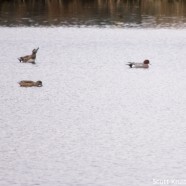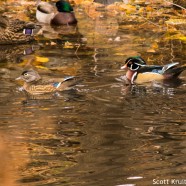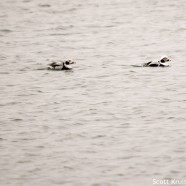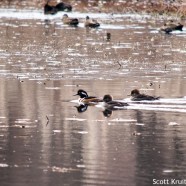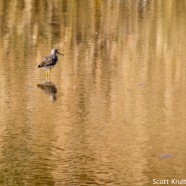Eurasian Wigeon (Anas penelope)
Can you identify the rarity in this photo? It is a distant record shot of five birds with the one in the upper right being of the most interest. There are four American Wigeons (Anas americana) and one Eurasian Wigeon (Anas penelope), the latter species being a rare but regular find in the United States. This was the cloudy scene on a small and otherwise unremarkable pond behind a high school in Connecticut earlier this week as the male Eurasian has been hanging out with this American group for a few weeks. All of the ducks were very busy feeding. You never know where unusual birds will...
Read MoreWood Duck Pair
If you live in or near wet woodlands, or even in a neighborhood with some forest habitat and a small pond, perhaps you will be fortunate enough to have Wood Ducks frequenting the area. During the winter months it is a good time to consider what you want to do with your yard and home to help birds. Determining what nest boxes you can erect in a few months for the spring arrivals and local breeding species can be a great activity on a quiet day. Wood Ducks like the cute couple pictured will already be pairing up next month!
Read MoreLong-tailed Ducks (Clangula hyemalis)
It is December duck time! I have been enjoying some of the new arrivals across our region as birds like Red-breasted Mergansers, Common Goldeneyes, Greater and Lesser Scaups, Ring-necked Ducks, Redheads, and these Long-tailed Ducks make their way to our shores. This species of diving duck certainly spends a long time underwater when it is feeding. It can even go down to near 200 feet! Their incredible patterns almost appeared camouflaged against the water on this cloudy late autumn day. Scott Kruitbosch Conservation & Outreach Coordinator
Read MoreHooded Mergansers (Lophodytes cucullatus)
Here is a group of Hooded Mergansers (Lophodytes cucullatus), a common species to spot on an unfrozen pond or lake near you right now. Chautauqua Lake is certainly a good place to find them – at least during this time of the year while it is not a solid block of ice. More of our waterfowl species are moving into the region as we have had an active and varied weather pattern. Have you had any surprises?
Read MoreGreater Yellowlegs feeding alone
This Greater Yellowlegs was found foraging alone in a shallow, still and serene November pond. It may seem lonely in this location but many of its friends and counterparts, I am certain, were not far away. A bunch of long-legged waders were enjoying the same waters. On that very day I recorded Dunlin, Sanderling, Black-bellied Plovers, and likely Short-billed Dowitchers. Who said shorebirding in New England couldn’t be a Thanksgiving sport? Thanks, climate change! Scott Kruitbosch Conservation & Outreach Coordinator
Read More



